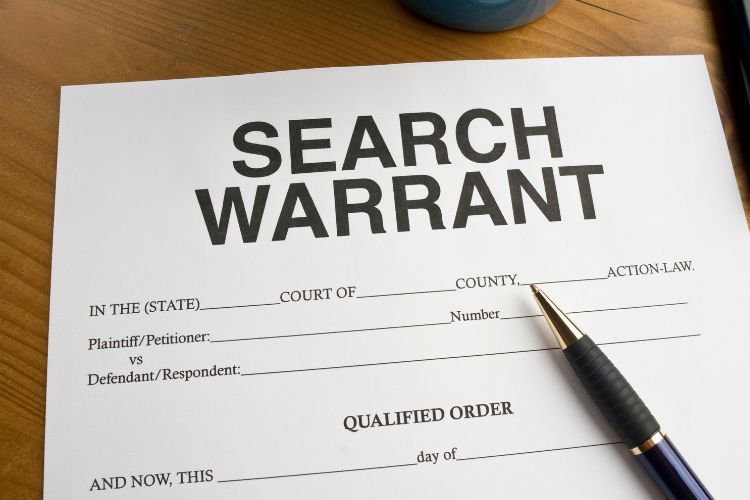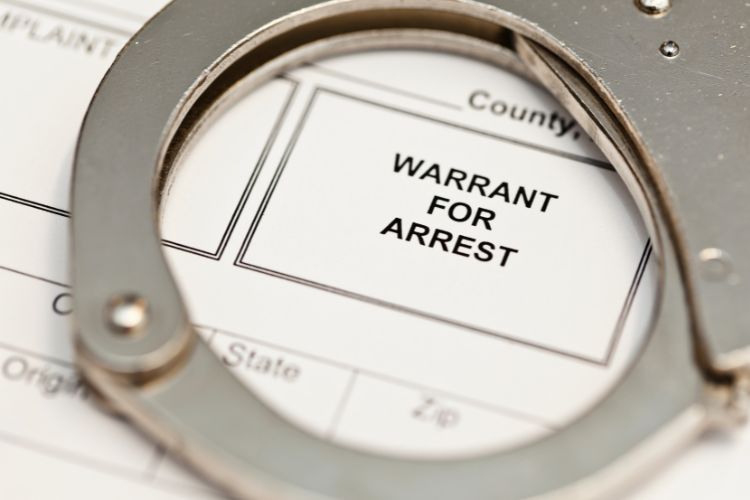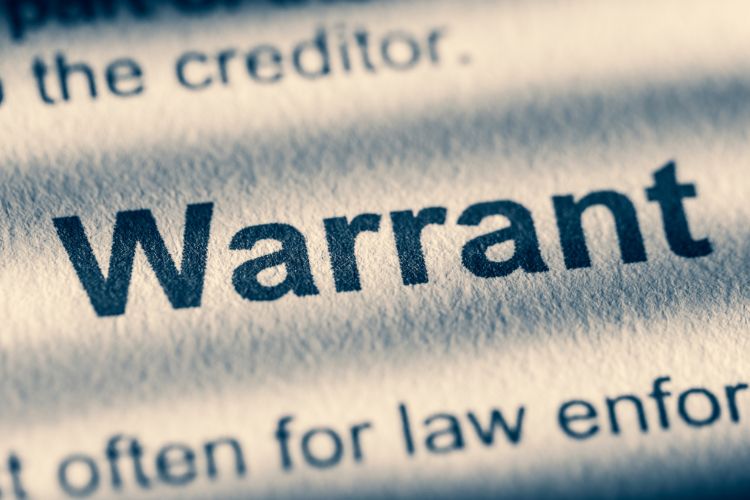What Are Warrants?
Understanding the role of warrants in background checks first requires a basic grasp of what a warrant is, how it is issued, and what kinds of offenses might lead to a warrant being issued against an individual.
Types of Warrants
A warrant is a legal document issued by a judge or magistrate, granting law enforcement the authority to perform a specific action related to law enforcement or judicial procedures. There are primarily three types of warrants:
- Arrest Warrants: These are issued when there is probable cause to believe that an individual has committed a crime. An arrest warrant grants the police the right to apprehend and detain the individual named in the warrant.
- Search Warrants: These permits grant law enforcement the authority to search a specific place for evidence related to a crime. Search warrants need to specify the area to be searched and what kind of evidence the police are looking for.
- Bench Warrants: These are usually issued when an individual fails to appear in court as ordered. A bench warrant allows law enforcement to arrest and bring the person to court.

How Warrants Are Issued
The process for issuing a warrant varies depending on the jurisdiction and the type of warrant but generally follows a similar structure. Law enforcement agencies or the district attorney’s office typically initiate the request for a warrant by submitting an affidavit to a judge. The affidavit must state the reason for the warrant, backed by evidence and facts, to establish probable cause.
Once the judge reviews the information and determines that it meets the legal criteria for probable cause, they may issue the warrant, authorizing law enforcement officers to carry out the actions specified in the document.
Types of Offenses Leading to Warrants
Warrants can be issued for various offenses, ranging from severe felonies to minor misdemeanors and even certain civil offenses. Here’s a brief rundown:
- Felonies: Serious crimes such as murder, armed robbery, or drug trafficking often lead to arrest warrants.
- Misdemeanors: Lesser offenses like petty theft, public intoxication, or disorderly conduct may also lead to warrants, usually of the arrest or bench variety.
- Civil Offenses: In some jurisdictions, failure to pay child support or violating a restraining order can result in a civil bench warrant.
Understanding these basic elements of what a warrant is, how it is issued, and what types of offenses can lead to one is foundational for grasping how they interact with background checks, which we will explore in the next section.
The Basics of Background Checks
Before delving into whether warrants appear on background checks, it’s essential to understand what background checks are, why they are conducted, and what they generally include. This knowledge can help you navigate situations where you either have to submit to a background check or need to perform one.
Definition and Purpose
A background check is an investigation into an individual’s personal, financial, and criminal history. These checks are often performed by employers, landlords, financial institutions, and other organizations to assess a person’s qualifications, character, and risk level. The overarching aim is to create a more secure environment by ensuring that individuals meet specific criteria, whether for employment, housing, or financial transactions.
What Background Checks Usually Cover
Background checks can range from simple to comprehensive, based on the requirements of the organization or individual requesting them. Typically, they cover the following areas:
- Criminal Records: This is often the most looked-at component. It includes arrest records, convictions, incarcerations, and sometimes even traffic tickets.
- Employment History: Employers frequently conduct background checks to verify an applicant’s work history, including past job titles, job performance, and reasons for leaving previous positions.
- Credit Checks: These are more common in financial transactions or rental applications. Credit checks provide a snapshot of an individual’s financial responsibility by revealing credit scores, outstanding debts, and payment history.
- Educational and Licensing Records: In some professions, verifying an applicant’s educational background and relevant licenses is critical.
Limitations and Legal Restrictions
Background checks are not without limitations, and they are regulated by several laws to protect people’s privacy and rights. These include:
- Fair Credit Reporting Act (FCRA): This federal law outlines what a background check can include and requires consent from the individual being checked.
- Equal Employment Opportunity Commission (EEOC) Guidelines: Employers must not use background check information to discriminate based on race, color, national origin, sex, or religion.
- State Laws: In addition to federal laws, each state has its own set of rules governing what can and cannot appear on a background check. Some states restrict the reporting of arrests that did not lead to convictions, or of convictions that are older than a certain number of years.
Do Warrants Show Up on a Background Check?
The short answer is Yes. The long one: it depends.
When it comes to background checks, warrants can sometimes appear as part of one’s criminal record. However, the inclusion varies based on several factors such as the type of background check, the organization conducting it, and even state laws. Here are some typical scenarios:
- Employment Checks: Most companies focus on convictions rather than warrants, but certain industries such as law enforcement or security-sensitive roles may delve deeper to include active warrants.
- Housing Applications: Landlords are often interested in an applicant’s criminal history and may find a warrant if they dig deep enough.
- Financial Transactions: Active warrants are less likely to show up in a credit check, but they might appear in more comprehensive checks, particularly if the warrant is related to financial crimes like fraud.
Legal Implications
If a warrant does appear on a background check, it can have varying degrees of impact:
- Job Applications: Employers may see this as a red flag, potentially leading to disqualification from the job application process.
- Rental Agreements: Landlords may be hesitant to rent to someone with an active warrant, fearing legal complications or issues of reliability.
- Other Legal Proceedings: An active warrant could also affect court judgments in divorce cases, custody battles, or other legal matters.
State-to-State Variation
State laws significantly affect whether a warrant will show up on a background check. Some states have more restrictive rules about what can be displayed in a background check, particularly for jobs that don’t involve vulnerable populations or high security. Others may allow a wide range of information to be displayed, including active and even resolved warrants.
Because state laws can greatly influence what shows up on a background check, it’s crucial to know the laws of both the state where the check is conducted and the state where the warrant was issued.
- Alabama
- Warrants are likely to appear on background checks, especially for jobs involving law enforcement or childcare.
- Alaska
- State law is more restrictive; therefore, unless the position requires a high-security clearance, warrants may not always appear.
- Arizona
- Warrants will generally appear in background checks, particularly for jobs requiring a fingerprint check.
- Arkansas
- Most employers will only see convictions, but warrants may appear in specific industries such as healthcare and law enforcement.
- California
- Due to stringent privacy laws, active warrants are usually not visible in most employment checks unless the job involves public safety.
- Colorado
- Active warrants will generally not appear in most background checks due to state privacy laws.
- Connecticut
- The presence of warrants in background checks is more restricted and generally will not show unless it’s a high-security job.
- Delaware
- Most general background checks may not show active warrants, but they will appear for law enforcement and security jobs.
- Florida
- Active warrants are likely to appear in background checks, particularly if it’s an FBI-level background investigation.
- Georgia
- Warrants will typically show up for positions involving vulnerable populations, such as children and the elderly.
- Hawaii
- State laws restrict the presence of warrants in background checks unless the job involves security or care for vulnerable populations.
- Idaho
- Background checks will often include warrants, especially for jobs related to law enforcement or financial institutions.
- Illinois
- Background checks in Illinois are generally focused on convictions rather than active warrants.
- Indiana
- Unless the position requires a high level of clearance, warrants are not generally displayed.
- Iowa
- In general, only convictions will appear on background checks.
- Kansas
- Warrants are likely to appear on background checks for jobs in law enforcement, education, and healthcare.
- Kentucky
- Active warrants are generally not disclosed in employment background checks.
- Louisiana
- For most general employment, only convictions will appear on background checks.
- Maine
- Active warrants are unlikely to appear on background checks due to state privacy laws.
- Maryland
- Background checks will include warrants for specific industries like healthcare, finance, and law enforcement.
- Massachusetts
- Due to privacy laws, background checks are more restrictive and less likely to include active warrants.
- Michigan
- General employment background checks are unlikely to show warrants, but they will be disclosed for high-security jobs.
- Minnesota
- Warrants generally don’t appear on standard background checks due to state privacy laws.
- Mississippi
- Warrants will often appear in background checks, especially if the job requires fingerprinting.
- Missouri
- State law allows active warrants to appear on background checks for specific jobs like healthcare and law enforcement.
- Montana
- Warrants are less likely to appear in background checks due to stringent state privacy laws.
- Nebraska
- Only convictions are usually disclosed on employment background checks, but law enforcement roles are an exception.
- Nevada
- Warrants will appear on background checks for jobs related to public safety, finance, and healthcare.
- New Hampshire
- Active warrants are generally not disclosed in most background checks.
- New Jersey
- State laws are more restrictive; therefore, warrants will generally not appear in background checks.
- New Mexico
- Warrants will generally not appear in background checks unless the job is related to law enforcement or financial services.
- New York
- New York’s background checks are generally more focused on convictions than warrants.
- North Carolina
- Active warrants are likely to appear in background checks, especially for jobs in healthcare and law enforcement.
- North Dakota
- Warrants are not generally disclosed in background checks due to privacy laws.
- Ohio
- Active warrants may show up in background checks for law enforcement and other high-security jobs.
- Oklahoma
- Warrants are usually not disclosed in employment background checks, except for positions requiring high security.
- Oregon
- Background checks will often include active warrants, especially for jobs related to public safety.
- Pennsylvania
- Warrants are likely to appear for positions that require higher levels of background scrutiny like healthcare and law enforcement.
- Rhode Island
- State law restricts the disclosure of warrants in background checks unless the position requires high security.
- South Carolina
- Active warrants will generally appear in background checks, particularly for law enforcement roles.
- South Dakota
- Warrants may show up in certain cases, especially if the job involves law enforcement or taking care of vulnerable populations.
- Tennessee
- Warrants are likely to appear on background checks, especially for jobs requiring a fingerprint check.
- Texas
- Active warrants will generally appear in background checks.
- Utah
- Background checks may include warrants, especially if the job requires a high level of security clearance.
- Vermont
- Warrants are generally not disclosed in background checks unless it involves law enforcement or security roles.
- Virginia
- Warrants will usually not appear on background checks unless it’s a high-security job.
- Washington
- Due to privacy laws, background checks usually do not disclose active warrants.
- West Virginia
- Warrants are likely to appear on background checks for roles in law enforcement and healthcare.
- Wisconsin
- Standard employment checks are unlikely to show warrants, but they will be disclosed for high-security jobs.
- Wyoming
- Active warrants are generally not disclosed in most background checks due to state privacy laws.
Remember, state laws can change and local jurisdictions might have their own rules, so always consult with a legal expert to understand the most current regulations.

What to Do If You Have a Warrant?
Discovering that you have a warrant against your name can be unsettling, especially if you’re about to undergo a background check for a job, rental application, or other important life events. In such scenarios, it’s crucial to be proactive and take steps to address the situation promptly.
Legal Advice
If you find out that a warrant has been issued against you, the first step is to consult with an attorney who specializes in criminal law or the particular area relevant to your warrant. This is vital because:
- A legal expert can explain the details of the warrant, its implications, and potential courses of action.
- They can represent you in court, helping to present your case more effectively.
- They can guide you through the legal maze of resolving a warrant, ensuring that you follow the correct procedures and do not unknowingly incriminate yourself.
The Process of Resolving a Warrant
The steps to resolve a warrant vary depending on the type of warrant and the jurisdiction, but some general guidelines include:
- Surrendering to Authorities: Although this sounds intimidating, it is sometimes the quickest way to start resolving the issue. The longer a warrant stays active, the worse it can look to a judge or anyone performing a background check.
- Posting Bail: If your offense is bailable, your attorney can help arrange this, allowing you to remain free while awaiting court proceedings.
- Court Appearance: Eventually, you will have to appear before a judge to resolve the issues leading to the warrant. This could involve various outcomes such as dismissal, fines, or more severe penalties.
Future Implications
Successfully resolving a warrant will not erase it from your record automatically. It may still appear on future background checks, depending on the jurisdiction and the nature of the resolved matter. However, some steps can help minimize its impact:
- Expungement: In certain cases, you may be eligible to have the warrant and corresponding records expunged, making them unavailable in most types of background checks.
- Disclosing Upfront: If expungement is not an option, being honest and upfront about the situation with prospective employers or landlords can sometimes mitigate the negative impact. People appreciate honesty, and explaining the circumstances can offer context that a simple record cannot provide.


